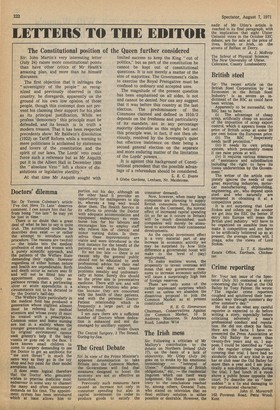Doctors' dilemma
Sir: Dr Vernon Coleman's article I've Got Here To Late' deserves comment. I can assure him that far from being "too late" he may yet be just in time. There is no doubt that a great deal of what he has to say is quite true. The automated medicine he describes does exist — or rather the attempt to introduce such procedure. The reasons are twofold — the intake into the medical profession of men and women with a purely scientific approach, and the patients of the Welfare State demanding their rights. However regardless of either human nature and health are unpredictable. Birth and death occur as nature sees fit and will not be fitted into an appointment system. Only experience reveals that a perforating ulcer or acute appendicitis is a circumstance not to be dictated to by the Doctor's half-day.
The Welfare State particularly in the medical field has produced a generation whose slightest ailment must be referred for medical attention and whose every ill must be treated with a prescription. Common sense and home nursing are lost in a society where the younger generation moving out of its original environment cannot seek granny's help if the baby vomits or goes red in the face. I have known small children to come to surgery demanding to see the Doctor to get an antibiotic for 'me sore throat" in much the same way as they go in the toy shop and buy paint for their model aeroplane kits.
It does seem logical therefore that the Doctor who genuinely wishes to practise medicine must endeavour in some way to channel the many and often unnecessary demands on his time. The appointment system has been introduced which at least allows him to portion out his day, although on the other hand it provides an opportunity for malingerers to slip in, whereas a long wait would deter them. The Health Service in its efforts to provide the Doctor with adequate accommodation and equipment endeavours to reimburse him for his labours and encourages him to employ staff who relieve him of clerical and minor nursing duties. In them selves these improvements are viable and were introduced in the first instance for the benefit of the patients as well as the Doctor.
Its not too late — there is no reason why the general public should not be educated to seek professional advice for their real troubles, and deal with lesser problems sensibly and undramati cally at home. Surely this should be the prime aim in preventative medicine. There still are, and will always remain Doctors who practise because they are concerned with the health of their patients, and with the personal DoctorPatient relationship which is frequently a large part of the beneficial result.
I am sure there are a sufficient number of Doctors whose dedication is enhanced and not discouraged by ancillary support. Helen Owen The Central Surgery, 2 The Strand. Goring-by-Sea.


































 Previous page
Previous page